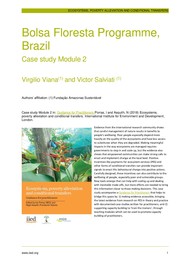China’s Eco Compensation Programme

The People’s Republic of China (PRC) has been experimenting for many years with eco-compensation programmes, as ways to redress missing market signals for ecosystem services (Zhang et al., 2009). This paper provides a brief insight into one of its larger programmes: the Sloping Land Conversion Programme (SLCP). ~The SLCP, also known as 'Grain for Green' is the largest ecological restoration project in PRC and the biggest payment for ecosystem services (PES) initiative in the developing world, with a total current investment of more than US$69 billion (Liu and Lan, 2015). It was launched together with the Natural Forest Protection Program (NFPP) as a response to the widespread flooding in the PRC in 1998 and has undergone four important developmental stages (see Figure 1). It is a key component of the Eco-Compensation Programme, which is a compendium of environmental policies and instruments, including environmental fiscal reform. The programme uses a series of conditional transfers alongside wider policies promoting off-farm income to encourage ecological restoration and contribute towards PRC’s vision of ‘ecocivilisation’.
This case study is one of several relating to the Toolkit: Ecosystems, poverty alleviation and conditional transfers. To access the full toolkit and other related case studies, please visit the ‘Publications’ section of the IIED project linked at the bottom of this page.
Cite this publication
Available at https://www.iied.org/g04270






